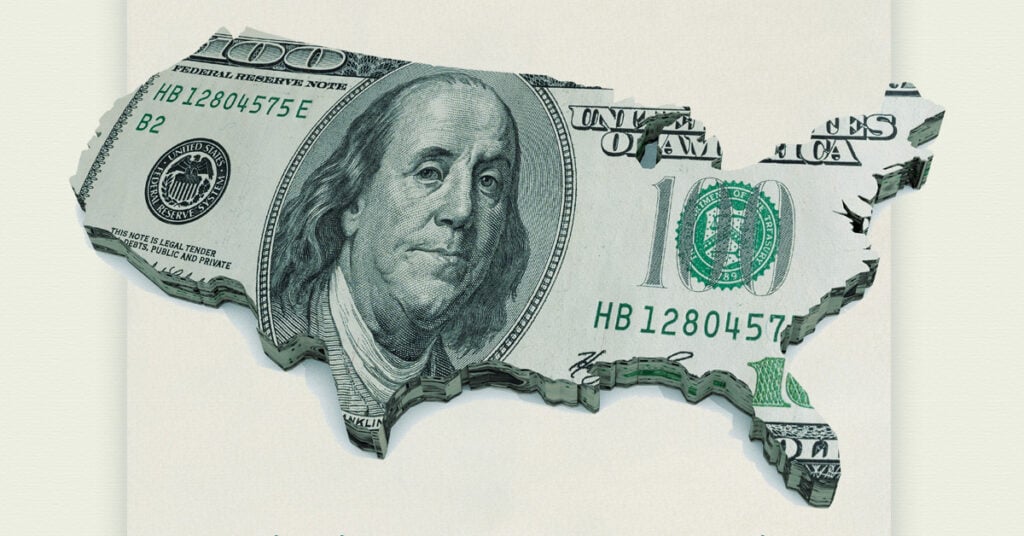Tackling wealth inequality through the tax code can boost economic opportunity
Washington, DC: Wealth inequality is rampant in every state and particularly concentrated in a handful of states, according to a first-of-its-kind analysis released today by the Institute on Taxation and Economic Policy (ITEP). This extreme wealth hinders economic opportunities for all but the most well-off families, and both reflects and exacerbates racial inequality. Tax policy is a critical way that policymakers could start addressing this inequality, but current law is clearly falling short. Federal and state tax codes barely tax extreme wealth at all, and instead often favor sources of income that are derived from wealth.
Ten states hold 71 percent of the nation’s extreme wealth, while just two states alone – New York and California – hold about a third. (The remaining 8 states are, in order, Florida, Texas, Illinois, Washington, Connecticut, Massachusetts, Maryland and Missouri.)
“A very small number of households hold a staggering share of nationwide wealth, and they’ve been able to grow their fortunes in part because our tax system asks very little of them,” said Carl Davis, ITEP’s research director and an author of the report. “New and strengthened taxes on extreme levels of wealth could dramatically reduce the runaway inequality we face today.”
The report defines extreme wealth as the wealth held by households with net worth over $30 million. This tiny fraction of families holds more than one in four dollars of wealth in the U.S. We estimate that total extreme wealth will reach $26 trillion this year with roughly one-fifth ($4.5 trillion) held by billionaires.
Other key findings:
- A nationwide tax of 2 percent on wealth over $30 million could have raised nearly $415 billion if it were in effect this year, while a similar tax applying only to wealth over $1 billion could have raised $62 billion.
- This tax would affect just 1 in 400 households nationwide, or 0.25 percent of the population. No state would see more than 0.5 percent of its population affected by such a tax.
- Ninety-two percent of extreme wealth is owned by white, non-Hispanic families.
- Nationally, a large share of extreme wealth – 43 percent – is held in the form of unrealized capital gains, meaning investment income on which these families have yet to pay tax (and may never pay tax under current law).
- A tax on the stock of unrealized gains in 2022 could be expected to raise between $529 billion and $3.9 trillion depending on the tax rate chosen and the percentage of gains deemed to be realized. The report models six different policy options for taxing unrealized gains.
- The Northeast is home to a higher concentration of extreme wealth and unrealized gains than any other region. The Midwest and South, by contrast, have significantly less extreme wealth and would tend to be least affected by a tax on such wealth.
In addition to a wealth tax or a tax on unrealized capital gains as outlined above, the report identifies other ways to strengthen the federal taxation of extremely wealthy people, including:
- taxing increases in wealth annually as an asset grows (mark-to-market taxation)
- taxing increases in wealth before they are passed on to heirs (ending stepped-up basis)
- eliminating the tax preference that makes tax rates on realized capital gains lower than on income from work
- strengthening the estate tax
- creating an inheritance tax
All of these are viable policy options for lawmakers looking to curb wealth inequality.
At the state level, tax codes are already overwhelmingly regressive when it comes to income – and are even more lopsided when it comes to wealth. State lawmakers seeking to fix this imbalance in their tax codes also have several readily available options as identified in the report, such as:
- implementing new or increasing current top income tax rates
- raising rates on realized capital gains income
- enacting progressive taxation of real estate wealth
- strengthening taxation of corporate profits and
- reinstating or enhancing estate and inheritance taxes
“Runaway wealth inequality is a huge problem that runs counter to the American ideals of democracy, opportunity and fairness,” said Amy Hanauer, ITEP’s Executive Director. “This report shows just how unequal wealth is across the country, and points to commonsense ways that we can use the tax code to decrease inequality and increase opportunity.”
###
The Institute on Taxation and Economic Policy (ITEP) is a non-profit, non-partisan tax policy organization that conducts rigorous analyses of tax and economic proposals and provides data-driven recommendations on how to shape equitable and sustainable tax systems. ITEP’s expertise and data uniquely enhance federal, state, and local policy debates by revealing how taxes affect both public revenues and people of various levels of income and wealth.




